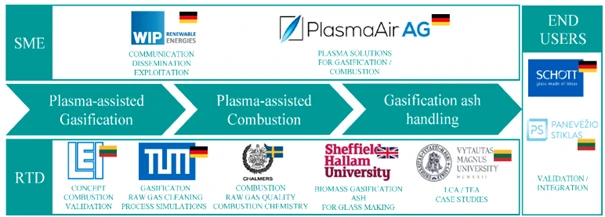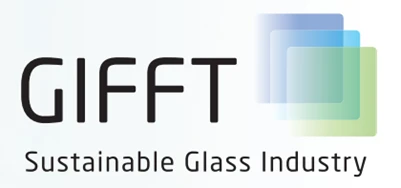GIFFT
Sustainable Glass Industry with Fuel-Flexible Technology
Motivation
The glass industry accounts for 4% of the total natural gas consumption in Europe. The motivation of the GIFFT project lies in the urgent need to significantly reduce the high CO₂ emissions of the energy-intensive glass industry, especially the high-temperature melting process. The glass industry accounts for 4% of the total natural gas consumption in Europe. Although major efficiency improvements have been achieved over the past decades – such as heat recovery, automation, and optimized energy processes – conventional technologies are now reaching their technical and thermodynamic limits. Since glass manufacturing still relies heavily on fossil fuels like natural gas, further reductions are hardly possible without new innovative technologies. The GIFFT project addresses this with a sustainable, hybrid, and biofuel-flexible heat production technology and process that can be integrated into industrial glass manufacturing through efficient use of plasma-assisted combustion and gasification systems.
Objectives
Within the project, a novel heat generation process concept for a sustainable, hybrid, and fuel-flexible low-CAPEX technology is developed. It will combine biomass e-gasification with syngas production, a plasma-assisted multi-fuel combustion device, and the utilization of ash materials as potential value-added raw materials for glass manufacturing.
The Chair of Energy Systems takes over the investigation of the e-gasification with the addition of plasma to the conventional gasification process. The project tasks can be summarized as follows:
Development of a 100kW plasma-gasification pilot plant based on the entrained flow gasifier at the Chair of Energy Systems to investigate the process regarding syngas composition, efficiency, and flexibility.
CFD modelling of the process for fundamental understanding of the process, identification of optimization potential, and scale-up applications of plasma gasification.
Process modeling of the different glass production processes, for overall process optimization and input data for techno-economic assessment.
Funding
The project has received funding from the European Union’s Horizon Research and Innovation Programme under Grant Agreement No. 101122257.
Project partners
LEI – Lithuanian Energy Institute (Project Coordination)
TUM – Technical University of Munich
CTH – Chalmers Uniersity of Technology
SHU – Sheffield Hallam University
VMU – Vytautas Magnus University
SCHOTT AG
PS - Panevėžio Stiklas
PlasmaAir AG

Contact
Sebastian Wilhelm, Jonas Brandstetter, Johannes Waßmuth, Dr. Sebastian Fendt
